It was August 15, 1947, when India attained Independence. This came after a series of historic events involving a great political and social struggle. The ultimate aim was to end the British rule in India. Britain had ruled over India for over 89 years. The initial intention of the Britishers was to carry out trade in India. But over time, they developed political and administrative ambitions.
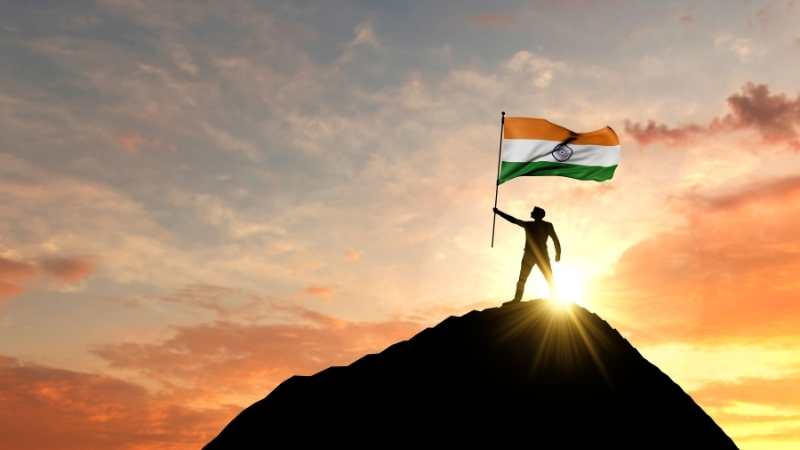
Some of the first nationalistic revolutionary movements for Indian Independence emerged from Bengal. Here are some of the details of the major Indian Freedom Movements post-1857.
The Indian Freedom Struggle
Indian nationalism began to take shape in the late nineteenth century, immediately after the rebellion of 1857 mutiny. It marked the conscious beginning of the fight for Independence from the British Colonial Empire. The 1857 uprising went by many names, such as the Sepoy Mutiny and the First War of Indian Independence.
The revolt of 1857 initially started as a mutiny. But it soon spread all over the country to overthrow foreign domination. Although this revolt was unsuccessful in 1857, it sparked the fire for Independence. This eventually resulted in a series of Indian nationalistic movements to end the British Raj.
Subsequently, the British East India Company gained much control over India’s internal affairs. However, the spirit of nationalism in India gained ground in the middle of the 19th century. This spirit was eventually strengthened by the formation of the Indian National Congress in 1885.
The Jallianwala Bagh Massacre
The 1919 Jallianwala Bagh massacre took place in Amritsar. It is yet another landmark portraying the struggle for freedom in India. Jallianwala Bagh involves the killing of hundreds of unarmed Indians and many more who were wounded by the British soldiers when they assembled, demanding freedom from the British Raj.
The Independence Movement Marches Ahead
The authoritative and indifferent attitude of the British towards the Indian sentiments led to the nationalistic movement gaining momentum. Patriotic national leaders like Mahatma Gandhi, Pandit Jawaharlal Nehru, Vallabhai Patel, and many others fought for the political and administrative rights of the people of India.
The British were ruthless in their dealings, especially with the leaders who fought for the rights of the Indians. Eventually, the divide-and-rule policy of the British led to the division between the Hindus and the Muslims and the formation of the Muslim League.
Other Indian Freedom Fighters
Shaheed Bhagat Singh
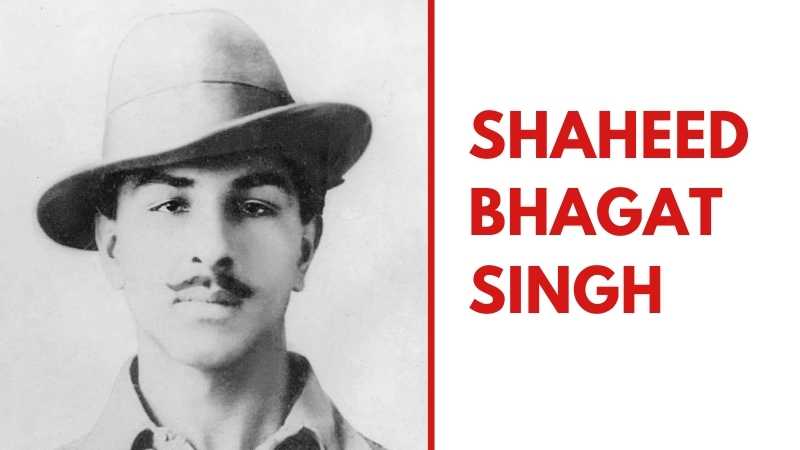
This freedom fighter was involved in two high-profile plots against British authorities in India. He helped galvanize the Indian independence movement against the British. He took part in a plot to slay the police chief responsible for the death of influential Indian politician Lala Lajpat Rai in 1928.
Bhagat Singh was born on September 27, 1907, into a Punjabi Sikh family in a village in the Lyallpur district of Punjab. Born to Vidyavati and her husband, Kishan Singh Sandhu, he was the second son of seven children. Bhagat Singh was hanged to death by the British at the tender age of 23 years.
Chandrashekhar Azad
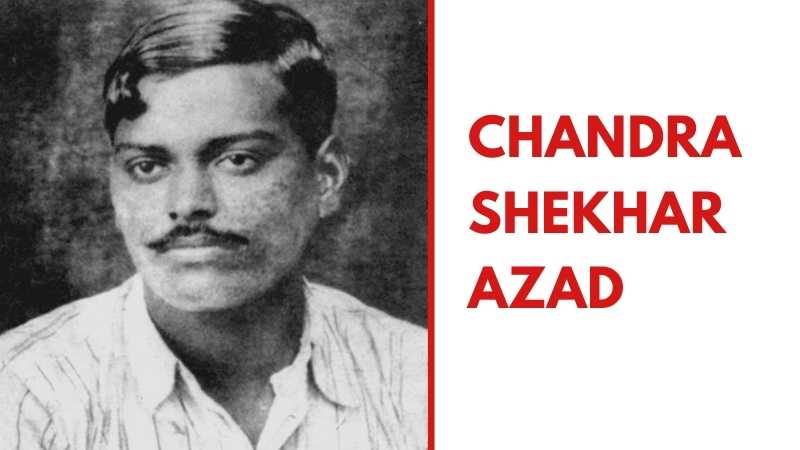
He is remembered as one of the mightiest freedom fighters. Born on July 23, 1906, in a small village in the Jhabua district of Madhya Pradesh, Chandrashekhar grew up with the Bhil tribal children. He was extremely fit to challenge and shake the British Empire physically.
On February 27, 1931, Chandra Shekhar Azad was in a fierce gunfight with the British forces. Aged 24, he died on the same day during the battle in a park. He is remembered as one of the companions of revolutionaries alongside the likes of Bhagat Singh and Ram Prasad Bismil. Chandrashekhar Azad was a prominent member of the revolutionary party Hindustan Socialist Republican Association.
Netaji Subhash Chandra Bose
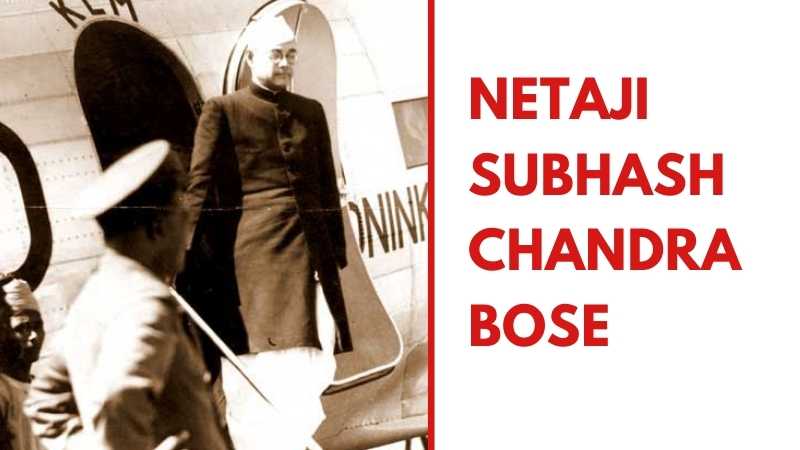
He is yet another prominent member of the Indian independence movement against British rule. Born on January 23, 1897, in Cuttack, Orissa, he died on August 18, 1945 in Taipei, Taiwan.
Bose studied at Presidency College in Kolkata, where he was expelled 1916 for nationalist activities. His parents then sent him to the University of Cambridge in England to prepare for joining the Indian Civil Services.
As a contemporary of Mohandas K. Gandhi, Subhas Chandra Bose led an Indian national force against the Western powers from abroad during World War II. Bose is known for his militant approach toward Independence and his leanings toward socialist policies.
Shivram Rajguru
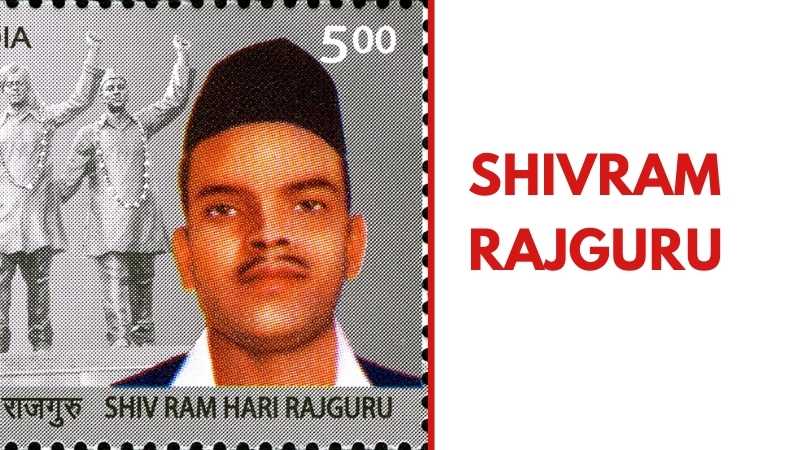
Remembered for his role in the assassination of a British police officer, J P Saunders, Rajguru had planned the assassination along with Bhagat Singh, Chandrasekhar Azad, and Sukhdev. It is said that Rajguru and Bhagat Singh fired the killer shots.
Jayi Rajguru was a stalwart warrior. A remarkable hero with a radiant personality, he was one of this land’s first and foremost martyrs. He fought against the might of British colonizers in the pre-nationalist age. His leadership played a vital role in shaping the freedom struggle.
Sukhdev Thapar
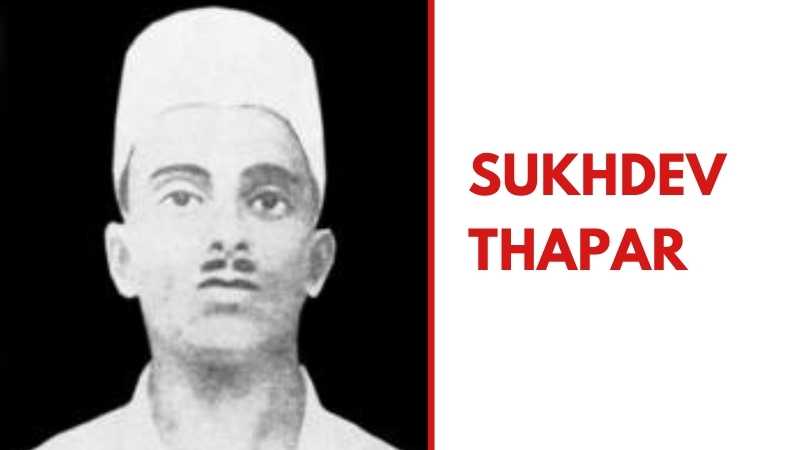
Belonging to a Punjabi Khatri family, Sukhdev Thapar was brought up by his uncle, Lala Achintram, after his father’s death. As a freedom fighter, he was a member of the Hindustan Socialist Republican Association. Sukhdev formed several revolutionary cells within Punjab and other areas of Northern India.
As a devoted leader of the Indian independence movement, Sukhdev went on to educate the youth at the National College in Lahore. He inspired them about the glorious past of India. Along with his comrades Bhagat Singh and Rajguru, Sukhdev was hanged on March 23, 1931, in Lahore Jail. The trio cheerfully proceeded towards the gallows, chanting favourite slogans like ‘Inquilab Zindabad.’
Sardar Udham Singh
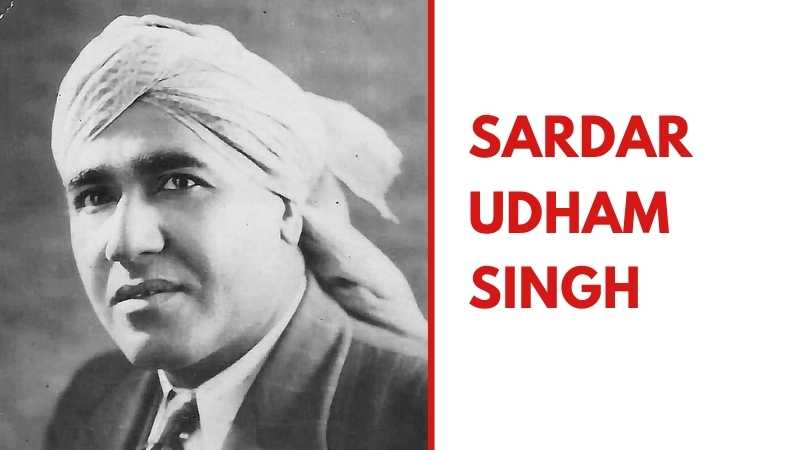
He is yet another Indian revolutionary belonging to the Ghadar Party and Hindustan Socialist Republican Association. The group is best known for assassinating Michael O’Dwyer, the former British lieutenant governor of Punjab in India involved in the Jallianwala Bagh massacre.
Bhagat Singh was the ideal for Sardar Udham Singh. He detested what happened in Jallianwala Bagh on April 13, 1919, which piqued his anger against British rule. He emerged as yet another youth of Punjab who had vowed to avenge this ruthless incident.
Sardar Udham Singh met Bhagat Singh in jail. He addressed Bhagat Singh as his ‘guru’. The influence of Bhagat Singh on Udham Singh was powerful and motivating. In 1924, Udham Singh joined the Ghadar Party. He was keen to organize overseas Indians to overthrow colonial rule.
Sardar Udham Singh shot Michael O’Dwyer on March 13, 1940, at Caxton Hall in London. He was charged and convicted of murder and sentenced to death. Subsequently, he was hanged and buried in Pentonville Prison on July 31, 1940.
The Role of Mahatma Gandhi in the Fight for Freedom

The Non-cooperation Movement led by Mahatma Gandhi during the 1920-1922 A.D. was aggressive against the British. This Civil Disobedience Movement for Independence continued throughout the 1930s. But it only gained ground during the Second World War.
The Civil Disobedience Movement further signalled a new stage in the struggle for self-rule. Mohandas Karamchand Gandhi’s Civil Disobedience Movement (1930-1931) was relaunched by the Salt March. It was a demanding case for discerning civil resistance.
The 1930-1931 Salt Satyagraha
The Salt ‘Satyagraha’ further facilitated the downfall of the British Empire in India. It drew upon a traditional South Asian cultural practice of the ‘Padyatra.’ It involved a long spiritual march that became a model of strategic action for many social movements to follow.
Gandhi, a leader of the Civil Disobedience Movement, reached the beach, scooped up a handful of mud, and declared that he was shaking the foundations of the British Empire. The seawater was then boiled to produce illegal salt. This act was then repeated by thousands of marchers, leading to the arrest of an estimated 60,000-100,000 men and women who participated in this mass public demonstration.
Widespread civil disobedience protests followed by grassroots actions took place nationwide. Picketing of shops selling foreign cloth and liquor took place, and bonfires were organized to burn British cloth. Other issues like Hindu-Muslim unity also came to the fore in the campaign, including an attack on the caste system and the elimination of ‘untouchability’.
Nevertheless, the Salt Satyagraha and other attempts failed to bring about Independence. However, it seriously undermined the power of the British authority and united the people of India in a movement for Independence under the leadership of the INC (Indian National Congress).
Gandhi encouraged the Dalits to participate in the struggle for freedom. He called them Harijan, meaning ‘Children of God.’ Masses were delighted to welcome him and started calling him ‘Mahatma’ (Great Soul). Mahatma Gandhi then took up many other relevant issues to determine the emerging characteristics of Indian society.
Nonetheless, the Indian National Congress cooperated with the British in war efforts during the Second World War. It was hoped that the British would leave India when it was over. But the British did not relent. Then Mahatma Gandhi began The ‘Quit India Movement’, which was started by Mahatma Gandhi in 1942. It was in 1947 that the British eventually realized they had to leave India for good.
Extremist Views Among the Indian National Congress Members
The spirit of nationalism received an impetus during the early 20th century. However, there were some extremist views among the Indian National Congress members. They did not favour the moderate stance taken by some national leaders and criticized the British for their overbearing and autocratic attitude toward the Indians.
The Rise of the Muslim League & Pakistan
The Muslim League sought Pakistan as a separate nation for them. The League was concerned that independent India would have Hindus at the helm of affairs.
However, it was planned that power would be divided between the Hindus and Muslims as proposed by the Cabinet Mission proposal. Yet, a senior leader of the Muslim League, Mohammad Ali Jinnah, did not agree to it.
The League favoured direct action, which led to Hindu-Muslim riots. In March 1947, Lord Mountbatten came to India and favoured the partition of Punjab and Bengal despite the civil war.
Gandhi did not favour partition and suggested that Jinnah should become the leader of a United India. However, this idea did not find the approval of many nationalist leaders within the INC. Eventually, the British Parliament passed the Indian Independence Act, which formed India and Pakistan as two separate countries.
Important Dates in India’s Struggle for Freedom
| Year | Event |
|---|---|
| 1857 | Indian Rebellion/First War of Indian Independence |
| 1885 | Foundation of the Indian National Congress |
| 1905 | Partition of Bengal, beginning of Swadeshi movement |
| 1915 | Mahatma Gandhi returns to India |
| 1919 | Jallianwala Bagh Massacre |
| 1920 | Start of the Non-Cooperation Movement |
| 1930 | Salt March led by Gandhi |
| 1942 | Launch of the ‘Quit India’ movement |
| 1947 | India gains independence from British rule |
| 1950 | India becomes a republic with the adoption of its constitution |
A Force To Recon With
Today, India is a sovereign republic and a force to reckon with. It is now considered the largest democracy in the world and has retained its secular identity. Nevertheless, thanks to the visionary approach of the founding fathers, there is a great potential this South Asian country exhibits, which is determined to shape the future of life and harmonious living on earth.
78 Comments
It is interesting and disturbing that you do not include “Krantikaarees” in your list of how India achieved independence. People like Bhagat Singh, Rajguru and Sukhdev, who gave there lives for the country. Hindu, Muslim and Sikh alike, all gave there live (majority being Sikh). Why may I ask do you not mention there sacrifice?
That is so true. We owe gandhiji many things but we also owe the krantikaarees as much if not more. They sacrificed without thinking twice and it is astonishingly tragic that they have not been included. Without those brave people, many indians would not have had the courage to fight and challenge the british monarch rule.
SHRADDHA,
WHO WERE THE KRANTIKAAREES?
THANKS
NORMAN
(normantewarie@yahoo.com)
That’s the best answer by far! Thanks for coibritutnng.
how many levels of irony are you on?
who were the krantikaris? seriously? I’m Mauritian and I know them….the Most Popular Bhagat Singh!
what are you telling
are you chating
India didn’t independence from Quit India movement. Infact the only reason India didn’t get independence earlier than 1947 was because of Gandhi who was used a pawn by Britishers to keep control of Indians in India. India got independence only after the effect of WW2 on British Raj. It was ordered by Queen to leave countries that they have overtaken and to do so in a systematic matter. If WW2 wouldn’t have happened, India would still have been under British Raj this day.
i totally agree with u …. england left india wen a special act was passed in the parliament of england …. but yes it was also due to pressure of indian leaders dat they were forced to leave india …an ofcourse due to world war 2
what would u do if u born before freedom
I agree. Even after independence, we have not achieved much for the masses. We are better off, but the elites found their ways to exploit the masses under British rule as well as under the current rule.
venkat,
where did u read about this or u came to know about this, i would like to know more about this issue.
thanks.
I SALUTE ALL THE FREEDOM FIGHTERS BUT GANDHIJI WAS A LEADER HE NEVER STOPPED OTHERS FROM FIGHTING HE JUST FOLLOWED THE POLICY OF NON VIOLENCE,WHICH WAS NEEDED VERY MUCH FOR INDIA.
SO ITS A SHAME ON US IF WE SAY SOMETHING BAD ABOUT HIM . AND ONE MORE THING IF GANDHIJI WAS BEING USED BY THE BRITISH YOU WOULD BE SITTING IN PRISON
i totally agree with u… if there would have been no WORLD WAR 2, still today in 2016,India would have been a colony of England…or we can say ADOLF HITLER is the main reason for our independence, NOT GANDHIJI…
so u would like to be in the hands to British. You people dont listen to u r parents wanted to be free.
I agree but
India would have gotten independence even if it wasn’t for WW2
It would have taken 20 years more but the backbone of the british would have been broken by the support for independence
No.
thats the first i heard abt the queen ordering indian independence. first, she can’t do that, she doesn’t have that power. second, why shud they leave india, their ‘jewel’, without some real problems?
British left India, because their Economy stumbled and civil unrest due to the WW1 and WW2. The Quit India Movement, Do or Die, Gandhi’s Disobedience movement etc were just a joke for British. The Free India was under control of Congress which publicized that Gandhi’s effort had made it and made him “Father of the Nation – India”, whereas in fact it should have been Father of Pakistan.
Untill 1947 the present India was British India colony + 600 odd Princely States. After that British colony was divided and Princely states were merged to for the current India. This is the major reason will still have problems between current political states and people.
it was not Gandhiji who wanted the freedom of 1947 … he was against it … he himself said that this independence is of no use as it is dividing our nation … that’s why only he was killed at the day of independence he was not even their in Delhi … he was in Kolkatta sitting in a room alone because he was against that freedom …
Probably,you have prejudice about Gandhiji. Gandhiji cannot be understood by the people like you. Gandhiji was in Kolkata at the time of independence ,it is true. But what for ? He was not interested in celebrating independence. But Kolkata ,particularly Noukali was burning by communal hatred ness. Even the army could not control the violence.Lord Mountbatten sent Gandhi to Noukali
Consoled victims ,convinced a tivists.Doyou know?one night he rushed into the crowd which was brutly trying to kill himdus and cried,”if you want to kill hindus,first you kill me.,I also a hindu”Thus he succeeded in controlling riots. LORDmt baten called Gandhi a single man army.Now you say was Gandhi a coward?selfish??Independence might not gained by Gandhi only .i agree. Bose, Bhagath singh,so on contributed in their own way. I bow before them.But love for extremists need not led tohatredness of Ganhi. I pray you please read history of Gandhi as well as SC bose with an open mind . Neither the men like Gandhi nor likeBose can be born in the world.please donot critisize them baseless.Thankyou.
I support you HS Srikantadatha Sir. Ppls of present time having lttl knowledge and ideas of past and the greatest men who gave us independence, open lips for criticisms . We should study self first – what I could have done for others, societies and for the NATION and what I am doing now rather than opening rhyming less lips. We now enjoy the world with our family members, friends etc b`coz of our predecessors sacrifice. Am I able and ready to do something like a “NEEMB KA EET” without hankering after self happiness and fame and glory?????????? JAI HIND, HINDUSTAN JINDABAD, BHARAT MATA KI JAI
It is interesting that still few are saying shut up! And some one saluting Mohandas. Indian National Congress formed by British and it was like a Union in a factory by Management not by Labours.
We studied text book history which designed by the Congress govt. Guys hunt Real history will tell you how we got freedom.
ADOLF HITLER gave us freedom indirectly…. He changed the whole world…Due to him only, WE ARE CITIZENS OF A FREE COUNTRY… had there been no WW2, and hitler would not have destroyed the economy of britain and weakened them, the britishers would have never left india….
i think that it is because of subhas chandra bose and the enormous army he got from singapore that made the british make up their minds that india is not for them
its to intresting and also proud to know about our freedom movement.
shut up
nice well nw i m clear about this history of our india independence
well we all are to be proud on our famous n our father of nation
i salut mahatma gandhi
niceeeeeeeeeeeeeeeee
thanks to u to give us such kind of knowledge
This mattter is very littel so plz try to add more information
I have got good understanding about this
I totall agree with Amar and Venkat. It is disturbing to see that the names of Shaheed Bhagat Singh, Shaheed Rajguru and Shaheed Sukhdev is no where mentioned when the word ‘Independent India” is mentioned. They were the sole reason for India to think and get the confidence to fight for Independence, unlike Gandhi who was happily living ruling over India and getting support from Brithish people.. those people who use to treat our ancestors.. us Indians and slaves. It is the Bhagat Singh’s thought which should strike our minds and heart and make Indians aware of the Facts! Its high time to wake up!!
its high time for YOU to wake up. what do you think you are great? if you were in gandhiji’s place you wouldnt even have done what he did rather you would have taken the side of british SO STOP TELLING ON OTHER PEOPLE WHEN YOU YOURSELF ARE USELESS
The most important fact missed out here is that the conservative party in Britain lost election to Labor party which was the main reason for getting independence as Labour party supported Indias cause of freedom.Had conservative party won the election of 1945 we wouldnt hv got the freedom.
Thanks for giving a brief but nice information regarding independence of India, but you should not ignore the contribution of Subhash Chandra Bose in the struggle for freedom.
This is a very good article that helped me understand the movement better! 🙂
Amar and Venkat, this article does have ‘brief history’ wriiten at the top of the page and it’s in the title, so of course its not going to include every little detail. If you don’t like the article, find a new one, stop bitichin’ about it!
This is a very poor hit on the history of India. This is what they teach children back in India as well (that is what I learnt too). Thanks to Internet, you find the real story of how India actually gained its independence.
To start with Mohandas Karamchand Gandhi’s initial objective was not freedom for India but peaceful co-existence between the British and the rest of the India. He is what one might say an opportunist. When the riots in Bengal took place (before the creation of East Pakistan and India), Muslims had slaughtered god-knows-how many non Muslims in Bengal. Gandhi just sat, when the non-Muslims got up to hit back that is when he went to Calcutta and did his usual mambo-jambo (can’t think of a better word).
Again, India (and most British colonies) needs to thank a tyrant called Hitler and a hero called USA for their freedom. If WW2 had not taken place there was no way British would have set any of their colonies free. The sudden decrease of man power back home forces British to set almost all their colonies free. British were not keen on letting go of India – after all it was the goose that laid the golden egg. Again, Britain had asked USA for monitory help (mind you USA was after Britain for a long time to set their colonies free including India and Britain always refused), USA laid the ultimatum to Britain that if they want USA to help Britain they would have to let go of all their colonies. Britain agreed to let go all their colonies but India. USA refused. It was this arm twisting by USA that forces Britain to ultimately let go of India.
Once India got its freedom it was in a very poor state. Not enough food grain to go around. There was ship loaded with grain leaving the west coast of USA with wheat for India (Bombay) and Pakistan (Karachi) every 30 minutes or so. USA had at that time advised Nehru to invest in growing better crop in India to feed the masses (instead of putting all the effort into industrializing initially). Nehru saw this as USA’s intention to keep India backward and divorced the relationship with USA. It was Lal Bahadur Shastri who heeded the USAs advise and bought the green revolution to India (Jai Kisaan Jai Jawaan was his slogan). By the way if you guys do not know, read the real history of Nehru. He went to Britain to learn law, but was quite a failure. Whereas most others like Gandhi, Valabh Bhai Patel, Jinnah to name a few were achievers.
I strongly recommend please do your research on the internet and come to your own conclusion. Education and especially history is heavily distorted back in India – it’s almost like propaganda in a way.
@Suraj: you write sarcasm but thruth.
There were many reasons for India to get Freedom but Unfortunately our books only showed us the fairy book story.
Till Date we appreciate very Few & have Missed many more Possible Reasons.
What ????
US entered the war in 1943
And no they didn’t had any pact like that
We won our freedom ourselves
Thanks all of u guys,,,,, that’s possible just becoz of ur secrefices…
Luv u… I luv my india….
i don’t know what to say but yes it was the greatest day ever. i wish if i could see all these happening in front of my eyes.the British ruled us but we still like them . what can be done now.i just want to say
HAPPY INDEPENDENCE DAY !
british ruled india because of hatred, selfish behaviour, plots by the people of our own indian soil…india wud have never improved in thoughts and humanity if english did not come to india….though people will blindly refuse this,it is the true fact….
i do agree with the facts of good deeds of British rule. The railway,industries, dams, electric projects, education, roads and all most all infrastructures what we are using till date are the trails of their rule. the unity itself was bought because of the implementations of Britishers. There was a time when the India fought against with in her, the local rulers and many territories. The British regulations maintained the peace and joined them with there tactics. In a way this led to the after year unity while fighting against the Britishers while keeping the vengeance of their old good days. To great extend the apartheid what were followed between the people here was abolished during the reign of foreigners. The system on inequality,exploitation of the weak, social anarchism, monarchies, unbalanced economical cult and so on was stabilized and attained grater color during their rule. For your information you can count the number of dams constructed before and after independence will nurture your ideas on these goods by Britishers. As a nation the treasures of India was unveiled by there influence only. So many goods that we still enjoys are the fruits of their rule(even we admit or not)
No they didn’t contribute shit to our economy
Dams bridges and stuff who told you these things
They reduced indian economy from 24% of the world trade share to 2% and starved and persecuted and tortured millions over millions to death
Education really they educated people like you to think they did any good
Electricity or dams
Not they didn’t build much of bcoz since independence we have build 4000 dams and before independence it was 14 dams
What a slave attitude dude
Industries
Yeah they destroyed our industries to benefit their industrial revolution back in England
What the fuck dude
You guys are nuts
i really appreciate mr venkat for fact about Indian independence it is true British realized after great loss done by Germany in WW 2
don’t see only history of india see history of world, you will truly know how india got independence because of WW 2 and germany,. because people who really fought for independence were really dead.
i am very proud to be a indian. thank you god to be a indian .I IOVE MY INDIA JAI HIND
i love my india
What about the Jallianwala Bagh massacre? I feel that played a big part in India’s independence: It gave a reason to be angry.
I just watched the movie “Earth”, by Deepa Metha, which is the story of the memoirs of a young girl, who lived through the struggles at the time of India’s independence. At the end of the film it says that over one million Indians were killed during that time. Should I say that this should be called a civil war? Indians killing Indians… and 12 million or so had to lose their home and flee to survive…how come all lived together peacefully under British rule: Hindus, Muslims and Sikhs…?? and suddenly, they started massacring each other, in the name of what? Freedom?!
I don’t know how any Indian can forget such shameful deeds… I for one will not be able to forget the strong images in this movie, such horror and human vileness! It breaks my heart… what good did all the ancient wisdom do India when it should have called upon that resource to help them establish independence…. Years and years of internal warfare! Doesn’t any Indian recall theses horrors and feel bad about that? I’m just wondering… I know for a fact that most Germans do feel very guilty even today, because of the horrible things they did to the Jewish people. It is a collective guilt!
I will start reading up on all the history of India about that time frame and what preceded, in order to gain a deeper insight!
there are many factors that forced the Britisher to left India. 1) by the end of the world war II British finance collapsed and they decided to retrace not only from India but many other colony. 2) the growing discontent among Indians people like Bhagat Singh and Subash Bose INA got large following and they grew day by day. 3) India was already in a mess due to poverty and population and difference between hindu and musllim. to rule India is to put pressure on British finance. its not just Gandhi we must read the other contemporary and their work including, Bhagat Singh,subash bose, tilak,Tagore,sir Churchill and many more. getting independence is not important but what to do with independence is more important. Read Where The Mind Is Without Fear, Bhagat Singhs last petition and churchils Our Duty in India. you will find many more in Subash Bose and Tilak’s writing. congress has misguided the people and have kept them in dark. bhagat singh and tilak were both editor of news papers and their works are midn blowing. congress still says bhagat singh is a naxalite and subash bose is a war criminal. independence is a state of mind and exploitation is exploitation whether its british or mixed of british indian or purely indian.
The British prime minister who graduated freedom to India “clementen” told due to INA(India National Army) formed by Subash Chandra bose, only
Again, India (and most British colonies) needs to thank a tyrant called Hitler and a hero called USA for their freedom. If WW2 had not taken place there was no way British would have set any of their colonies free. The sudden decrease of man power back home forces British to set almost all their colonies free. British were not keen on letting go of India – after all it was the goose that laid the golden egg. Again, Britain had asked USA for monitory help (mind you USA was after Britain for a long time to set their colonies free including India and Britain always refused), USA laid the ultimatum to Britain that if they want USA to help Britain they would have to let go of all their colonies. Britain agreed to let go all their colonies but India. USA refused. It was this arm twisting by USA that forces Britain to ultimately let go of India.
I think what Gandhi did was good but i believe Pakistan division from India was most important
You are wrong Gandhi was not responcible for partition of India.
LOOKING FROM ACROSS THE SEAS AS AN INDIAN, READING YOUR HISTORY TELLS A SAD STORY; GANDHI WAS AGAINST INDEPENDENCE,he feared it would break up India, and that’s EXACTLY what happened. That power drunk Jinnah just was itching to be prime minister of Pakistan,look how many millions died? The lil farkir was a genius. Of course they were others like Bhagat Singh, Bose,Rajguru and Sukhdev, not forgetting Churchill who feared Gandhi, he made the British quake in their boots. Indians all over the world should be proud of Karamchand Mohandas Gandhi. Its true England never wanted to part with their Jewel of the crown, the same way they never wanted to give the slaves their freedom but it was not economical for them to keep them, it was costing them too much money. Always trace the money and you can find the root of ANY evil. The British didn’t care about the plight of the Indians they knew millions of lives would be lost in the SEPARATION but they ruled by “DIVIDE AND RULE” LOOK AT THEIR HISTORY AROUND THE WORLD. HAPPY INDEPENDENCE!
its funny how even though british is painted as villans ….they gave us indians so many things lyk so many buildings :P,a united nation ,made us stop this untouchable business,made us give girls
a bit of respect….sumtymes i even think we owe british more than anyone else…sumtimes i also think even gandhiji knew dat fact….if i said anything dat angers u please accept my apologies
This gave me better information on the independence movement of India
Sreema, before the British arrived India, India had the largest GDP in the world 22% of the world. After 200 years it was less than 1%. Now You decide what British gave us. Peenuts? If british did not give us railways and road we would not have got them? It’s foolish to think that way
I agree with ur reply krishna
I hate Gandhi and I feel that instead of being grateful for Gandhi. it is better to be grateful for other leaders like Subash Chandra Bose etc.
Would you like to elaborate on your reason
Dear friend,though you hate Gandhi,he loves you. If you want to honour Bose I too join with you. But love for Bose never demands the hatred towardsGandhi.are there any genuine reasons in you to hate Gandhi?if so please write here. I am confident that I can clear misconceptions about Gandhi.
why do you think so? what did Subash Chandra Bosedo that gandhi didn’t???? >:(
pls answer me!!!!
true
I don’t like that lord Mountbatten was not mentioned although he did good
this website is the best
i want to be tell that it was so intresting thank you gandhiji
How come their is no Bhagat Singh, Raj guru and Sukhdev’s name in this stupid thing.
We don’t even got independence because of Gandhi. Gandhi was stupid and only listen to Nehru or British peoples. Why Indian peoples don’t remember Bhagat Singh. We got Independence because of lots of peoples, but Bhagat singh was the biggest part of Indian Independence.
sry once again don’t know what is happening this not 1714 , it is 1914 when he return to india
this is a true story of our loving nation india before idependence
It is.
Gandhi did a lot for the country we do admire other people but Gandhin is important. Also who else fights for the country with people who have guns and all.
i have always wondered about two things,1.) how did british conquer it as a nation and started ruling ? it was not an united nation (politically and geographically) to capture ? 2.) after so many of years of being ruled by British, why did Indians suddenly wake up to get freedom ?
India got independence not only due to protest by freedom fighters but also due to loss suffered by England in World War 2. England did not had enough financial resources to manage and control/govern its colonies/slave countries; and Indian people wanted to be free from their rule as British government had exploited all the Indian resources (financial, physical and human)way too much making India a poor country. So to conclude we can say that there’s no single reason for India’s independence, several conditions and situations or we may call it factors led to independence from British government.
all i want to know is why india left the british empire
India got indipendance because of World War II. According to United Nations treaty UK, Germany, France had to leave all colonial state like Congo,jordan,Palestine, India,mynmar,srilanka,south Africa,malaysia ,iran,Egypt etc . Most of the states got indipendance between 1945-50
where is bhagat singh name in there. everyone thinks they get independence because hindu did all the work but bitter truth is that sikhs always gave there lives to save others and yet there is no name for them. and yet udam singh nephew is jobless and governement did not do shit about that. he took revenge by executing the colonel who killed countless people in jaliawala bagh